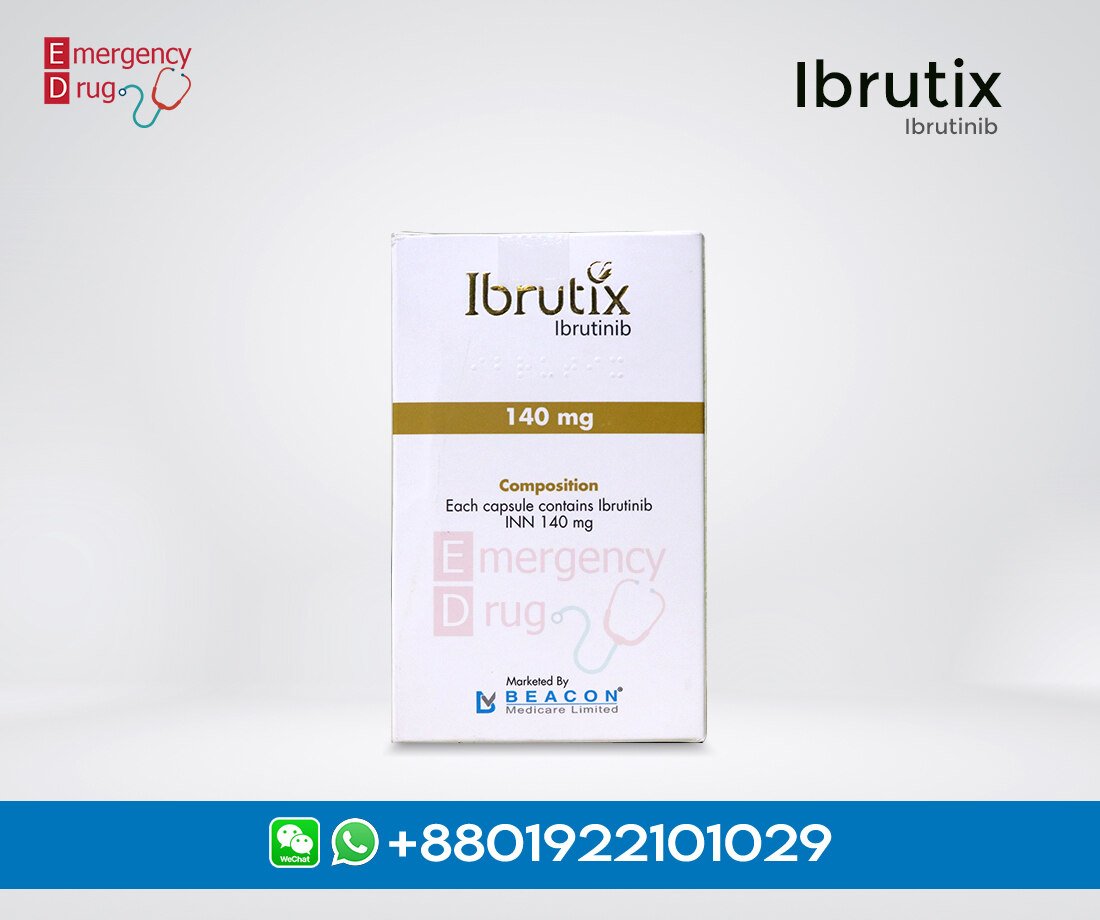Ibrutinib
Ibrutinib
Showing all 4 results
Ibrutinib Drug
What is Ibrutinib?
Ibrutinib is an oral medication primarily used to treat certain types of blood cancers, including chronic lymphocytic leukemia (CLL), mantle cell lymphoma (MCL), Waldenström’s macroglobulinemia (WM), marginal zone lymphoma (MZL), and chronic graft-versus-host disease (cGVHD). It is classified as a Bruton’s tyrosine kinase (BTK) inhibitor.
- Chronic Lymphocytic Leukemia (CLL): Ibrutinib is used both as a first-line treatment and in cases where the disease has relapsed or is refractory.
- Mantle Cell Lymphoma (MCL): Approved for patients who have received at least one prior therapy.
- Waldenström’s Macroglobulinemia (WM): Used to treat this rare type of non-Hodgkin lymphoma.
- Marginal Zone Lymphoma (MZL): For patients who require systemic therapy and have received at least one prior anti-CD20-based therapy.
- Chronic Graft-Versus-Host Disease (cGVHD): Used after failure of one or more lines of systemic therapy.
Ibrutinib, sold under the brand name Imbruvica.
Understanding Ibrutinib and Its Role in Treating Cell Malignancies
Ibrutinib is a targeted therapy primarily used in the treatment of certain cell malignancies such as chronic lymphocytic leukemia (CLL), mantle cell lymphoma (MCL), and Waldenström’s macroglobulinemia. This powerful oral medication works by blocking Bruton’s tyrosine kinase (BTK), a protein that helps cancer cells survive and multiply.
Patients seeking trusted ibrutinib brand names often explore options like Imbruvica or its generic equivalents available at EmergencyDrug.com, where affordability meets quality. Ibrutinib has transformed outcomes for many, offering hope in cases that were once considered life-threatening.
FDA Approval of Ibrutinib
The Generic has seen a series of FDA approvals since its introduction. Initially approved in November 2013 for mantle cell lymphoma, its use was expanded in February 2014 to include chronic lymphocytic leukemia (CLL).
In 2015, it gained approval for treating Waldenström’s macroglobulinemia (WM). March 2016 saw a new indication for CLL, followed by another expansion in May 2016 to cover both CLL and small lymphocytic lymphoma (SLL).
In January 2017, it was approved for adults with relapsed/refractory marginal zone lymphoma (MZL) requiring systemic therapy after at least one prior anti-CD20-based therapy.
August 2017 marked its approval for treating graft-versus-host disease, the first FDA-approved drug for this condition.
A tablet formulation was approved in February 2018, and later that year, in August, its combination with rituximab was approved for adults with WM. Most recently, in January 2019, a combination with obinutuzumab was approved for previously untreated CLL/SLL.
Mechanism of Action
Ibrutinib is a medication used to treat certain types of cancer, particularly blood cancers like chronic lymphocytic leukemia (CLL) and mantle cell lymphoma (MCL). Here’s a simple explanation of how it works:
Understanding Cancer Growth:
Cancer cells grow and multiply using various signaling pathways inside the cells. These pathways act like communication networks, telling the cells when to grow and divide.
Role of BTK Protein:
One key protein involved in these signaling pathways is called Bruton’s tyrosine kinase (BTK). BTK helps send signals that promote the growth and survival of cancer cells, especially in blood cancers.
How does Ibrutinib Works:
Ibrutinib is a type of drug known as a BTK inhibitor. It specifically targets and binds to the BTK protein. By doing this, ibrutinib blocks the BTK protein’s activity.
Blocking Growth Signals:
When ibrutinib binds to BTK, it effectively turns off the signals that tell the cancer cells to grow and survive. This interrupts the cancer cells’ ability to multiply and spread.
Promoting Cancer Cell Death:
Without the growth and survival signals from BTK, the cancer cells become weaker and are more likely to die off. This helps to control the cancer and reduce the number of cancer cells in the body.
In summary, ibrutinib works by targeting and inhibiting the BTK protein in cancer cells. By blocking BTK, it stops the signals that promote cancer cell growth and survival, leading to the death of the cancer cells and helping to control the cancer.
Ibrutinib Side Effects
The Capsule is used to treat several conditions, and while many side effects are common across different indications, there can be variations based on the specific disease being treated and the patient population.
Managing Side Effects: From Fever and Chills to Heart Problems
While Ibrutinib can be life-saving, it’s essential to understand potential risks. Common ibrutinib side effects include fever chills, diarrhea, muscle pain, and fatigue. However, more serious complications like heart problems, including atrial fibrillation and high blood pressure, may occur in some patients—particularly those with pre-existing cardiovascular conditions.
It’s critical to notify your doctor immediately if symptoms worsen. Additionally, avoid Seville oranges, grapefruit, and similar citrus fruits, as they can interfere with the way your body metabolizes ibrutinib, potentially increasing the risk of side effects.
Ibrutinib cll side effects – Chronic Lymphocytic Leukemia (CLL) and Small Lymphocytic Lymphoma (SLL)
Common Side Effects:
- Diarrhea
- Fatigue
- Nausea
- Bruising
- Musculoskeletal pain
- Rash
Serious Side Effects:
- Increased risk of infections
- Bleeding (including severe hemorrhage)
- Atrial fibrillation
- Hypertension
- Tumor lysis syndrome (rare)
Mantle Cell Lymphoma (MCL)
Common Side Effects:
- Diarrhea
- Fatigue
- Nausea
- Bruising
- Upper respiratory tract infection
- Rash
Serious Side Effects:
- Bleeding
- Infections
- Atrial fibrillation
- Peripheral edema
Waldenström’s Macroglobulinemia (WM)
Common Side Effects of ibrutinib:
- Diarrhea
- Fatigue
- Nausea
- Bruising
- Muscle spasms
Serious Side Effects:
- Bleeding
- Atrial fibrillation
- Infections
- Pneumonia
Marginal Zone Lymphoma (MZL)
Common Side Effects:
- Diarrhea
- Fatigue
- Nausea
- Bruising
- Cough
- Rash
Serious Side Effects:
- Bleeding
- Infections
- Atrial fibrillation
- Hypertension
Chronic Graft-Versus-Host Disease (cGVHD)
Common Side Effects:
- Fatigue
- Bruising
- Diarrhea
- Nausea
- Muscle spasms
Serious Side Effects:
- Bleeding
- Infections
- Pneumonia
- Atrial fibrillation
Combination Therapy (with Rituximab or Obinutuzumab)
Common Side Effects:
- Diarrhea
- Fatigue
- Nausea
- Bruising
- Pyrexia (fever)
- Rash
Serious Side Effects:
- Infusion-related reactions (specific to combination with monoclonal antibodies)
- Infections
- Bleeding
- Atrial fibrillation
- Neutropenia (low white blood cell count)
Dry Skin
If you experience any unexpected changes such as persistent dry skin, or any new skin-rash, peeling or irritation while on Ibrutinib, you should call your doctor promptly. Skin-related side effects, though not the most common for this drug class, can signal underlying issues that merit review.
General Monitoring and Management
Regardless of the indication, patients taking ibrutinib require regular monitoring for blood counts, liver and kidney function, and signs of infection, bleeding, and cardiovascular issues. Adjustments to dosage or supportive treatments may be necessary based on the patient’s response and side effect profile.
Important Precautions: Blood Cell Counts and Food Interactions
Before starting treatment with ibrutinib, your healthcare provider will likely perform blood tests to monitor red blood cells, white blood cells, and platelets. This is crucial as ibrutinib can lower blood cell counts, increasing the risk of infections and bleeding.
Patients are advised to avoid foods like Seville oranges, which contain compounds that can impact liver enzymes and affect how the drug is processed. Whether you’re just beginning treatment or managing long-term therapy, EmergencyDrug.com provides reliable access to ibrutinib and expert support to help you navigate this essential cancer treatment safely.
Consultant
Always remember to talk to your doctor before making any changes to your dosage schedule or if you are considering taking any new over-the-counter medications, supplements or herbal remedies. Because Ibrutinib interacts with many other treatments (and carries important warnings), your doctor’s guidance is essential.
Ibrutinib Package Insert
Dosage and Administration
Ibrutinib is administered orally, typically once daily. Ibrutinib capsules and tablets should be swallowed whole with a glass of water. Do not open, break, or chew them.
Ibrutinib Dose:
Chronic Lymphocytic Leukemia (CLL) and Small Lymphocytic Lymphoma (SLL)
- Monotherapy: 420 mg once daily. (three ibrutinib 140 mg)
- In Combination with Rituximab or Obinutuzumab: 420 mg once daily.
Mantle Cell Lymphoma (MCL)
- Monotherapy: 560 mg once daily. (four 140 mg)
Waldenström’s Macroglobulinemia (WM)
- Monotherapy: 420 mg once daily. (three 140 mg)
- In Combination with Rituximab: 420 mg once daily.
Marginal Zone Lymphoma (MZL)
- Monotherapy: 560 mg once daily for patients who require systemic therapy and have received at least one prior anti-CD20-based therapy.
Chronic Graft-Versus-Host Disease (cGVHD)
- Monotherapy: 420 mg once daily after failure of one or more lines of systemic therapy.
For dose modification contact your doctor because dose modification depends on ibrutinib adverse effects you are going through.
Missed a dose?
If you miss a dose of ibrutinib Take it as soon as you remember on the same day. Do not take an extra dose to make up for the missed one. Simply take the next dose at your regular scheduled time the following day.
Try to take ibrutinib at the same time each day to maintain consistent blood levels of the medication. Never take two doses at once to compensate for a missed dose, as this can increase the risk of side effects.
Storage
When taking Ibrutinib, it’s important to store it at room temperature – typically between 20 °C to 25 °C (68 °F to 77 °F) – and away from excess heat, moisture or direct sunlight to maintain its effectiveness. Discard if changed color.
Where to Buy Ibrutinib
For verified export-quality Olanib, patients and caregivers can visit:
🔹 EmergencyDrug.com – a global pharmaceutical exporter specializing in oncology, immunology, and rare disease treatments.
You’ll find detailed product information, pricing, and worldwide delivery support through licensed pharmaceutical channels.
FAQs
1. How should I store Ibrutinib at room temperature?
Ans: Store Ibrutinib capsules or tablets at room temperature (20 °C–25 °C) in a dry place, away from direct sunlight and moisture. Keep it in the original container and out of reach of children. Discard if changed color.
2. When should I call my doctor while on Ibrutinib?
Ans: Call your doctor immediately if you experience unusual bleeding, chest pain, irregular heartbeat, persistent fever, or dry skin with peeling or rash.
3. Can Ibrutinib cause dry skin or rash?
Ans: Yes. Some patients experience dry skin, rash, or mild irritation. Use gentle skin moisturizers and inform your doctor if symptoms persist.
4. What should I do if I miss a dose of Ibrutinib?
Ans: Take it as soon as you remember on the same day. Never double the dose – take the next dose at your regular time.
5. Should I talk to my doctor before taking other medicines with Ibrutinib?
Ans: Absolutely. Always talk to your doctor before using new prescriptions, herbal products, or supplements, as Ibrutinib can interact with other drugs.
======================================================================================================
Disclaimer: Before using or buying any meds, please consult with your doctor. Do Not Stop any meds without consulting your doctor.
For more Oncology medicine, visit our SHOP




